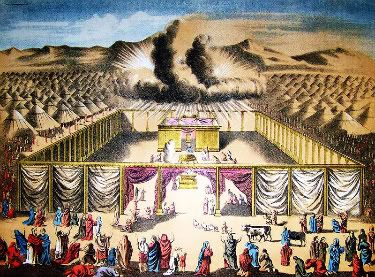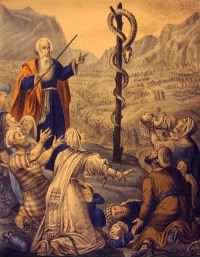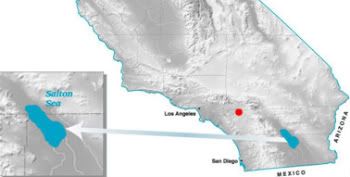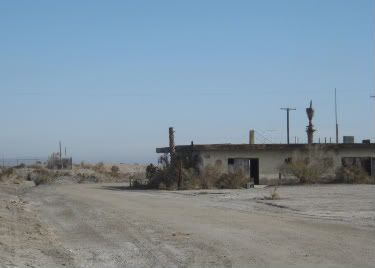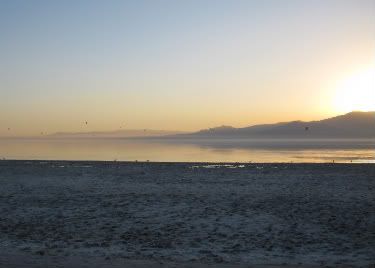The statement could perhaps be made that it is impossible to overestimate the degree of any attribute possessed by God. When we say God is faithful we could never overestimate His faithfulness. Or when we say He is just we could never overestimate His justice. No entity exists which possesses a higher degree of faithfulness or justice than God. I think this same rule can be applied to His other attributes. There are two attributes of God where I think this truth is especially important. This is because one of these attributes tends to be distorted and then underestimated in reaction to that distortion. The other of these attributes is either completely ignored or greatly underestimated even by the majority of those claiming the name "Christian." The first attribute is the love of God and the second is the holiness of God. And these two attributes and seeing them in their fullness are linked to one-another.
Most simply, in regards to God's love, it is twisted into a false licentiousness-encouraging attribute where God becomes not only a lover of sinners but also a lover of sin if not at least an affirmer of sinfulness. It is this false conception of the love of God which will speak of Christ spending time with and befriending notorious sinners while it refuses to speak of Him calling them to repentance. It is this false-love which will tell the story of the woman caught in adultery and Christ saying, "Let him who is without sin among you be the first to throw a stone at her (John 8:7)," but will leave off the end of the story where Christ says to this woman, "go, and from now on sin no more (John 8:11)." Christ's love was a love which defended the sinner but it was also a love which condemned sin and commanded repentance.
In reaction to this twisted version of God's love some who are orthodox in theology begin to speak as if this heretical conception of God, often held by theological liberals, is of a God too loving. This implies that the orthodox understanding of God, that is the true understanding, is of a God less loving. But the moment a "God less loving" is conceived of, this attribute of God, His love, is thought of in such a way that there could be an entity possessing a greater degree or quality of love than God. The God of whom it was written, under the inspiration of the Holy Spirit, "God is love (1 John 4:8b)," is not a God who should be thought of as possessing the attribute of love to a lesser degree than He possesses all of His other attributes such as omnipotence or omniscience. The love of God is not an attribute which can be overestimated.
God's love is underestimated in response to a heretical error. His holiness is underestimated out of our own sinful blindness to spiritual reality. It is uncomfortable and inconvenient to think of God's holiness. Our sinful flesh wants to bring God down to our level. Our sinful flesh wants to believe that God exists for man's convenience instead of the truth that man exists for God's glory. In our sinful blindness we can assume with the wicked in Psalm 50:19-21:
You give your mouth free reign for evil,
and your tongue frames deceit.
You sit and speak against your brother;
you slander your own mother's son.
These things you have done, and I have been silent;
you thought that I was one like yourself.
But now I rebuke you and lay the charge before you.
In forgetfulness of His transcendent and absolute moral holiness it is assumed that God is one like ourselves. Instead of a God who is a consuming fire (Heb. 12:29), instead of a God from whom the glorious and sinless seraphim must shield themselves (Isaiah 6:2), instead of a God who in His just wrath would be right to consume all sinners from the earth we make for ourselves a blasphemous and non-threatening self-help guru in the clouds. As with the powerful statement from the Apostle John concerning God's love, we find an equally powerful statement, repeated twice in Scripture, once in Isaiah and once by the same Apostle John. In this statement, God is revealed as thrice holy: "holy, holy, holy," say the seraphim of Isaiah and the four living creatures of Revelation (Isaiah 6:3, Rev. 4:8). No other attribute is ascribed to God in this same manner. The holiness of God can never be overestimated nor, I think, can we begin to grasp the infinity of His holiness in this life.
A third underestimation, also touching on God’s love, must be taken into account. In underestimating God's holiness the attempt is made to pull God down to our level, but sinful man, in pride, also seeks to exalt himself to the level of God. He does this by underestimating his own desperate condition, by underestimating his own depravity. But Scripture teaches differently, revealing that, "every intention of the thoughts of his [man's] heart was only evil continually (Gen. 6:5)," that, "the intention of man's heart is evil from his youth (Gen 8:21)," that, "together they have become corrupt; there is none who does good, not even one (Psalm 53:3)," and as Paul teaches in Ephesians, outside of Christ we were dead in our sins and by nature children of wrath (Ephesians 2:1 & 3).
When God's holiness is underestimated or in reality denied no clear picture of God's love can be seen. When God's holiness is underestimated any kind of love ascribed to God will be of a lesser degree or quality than the love which is ascribed to a God who is infinitely holy, that is, the true God. Therefore the heretical god of liberal theology is in reality a god less loving than the true God of any orthodox believer. God’s holiness is connected with His love because only when He is known as infinitely holy can there be any conception of the guiltiness of sinners before Him and therefore of the depth to which He condescended, in love, in saving those same sinners.
Along these same lines, when human depravity is underestimated the nature of Christ’s mission in His incarnation, death and resurrection is obscured. It is obscured because we begin to see ourselves as somehow worthy of redemption. The condescension of Christ becoming man is lessened when we imagine ourselves to be better than we are. As with the necessity of a correct understanding of God’s holiness to see His love, our depravity must also be considered if we are to see the infinite degree of love displayed on the cross. Paul touches on this when he writes, “For one will scarcely die for a righteous person - though perhaps for a good person one would dare even to die - but God shows his love for us in that while we were still sinners, Christ died for us (Romans 5:7-8).” While we were nothing but God-hating rebels, God the Son descended among us to suffer our hate and God’s wrath to save sinners.
Christ defines love for us and His definition is put on display in His suffering and death on the cross. Christ said, "Greater love has no one than this, that someone lay down his life for his friends (John 15:13)." The Apostle John also reflects on Christ's definition writing, "By this we know love, that he laid down his life for us . . . (1 John 3:16a)." As sinful men whose hearts are "deceitful above all things (Jer. 17:9)," we will inevitably define love in a deficient manner. We must therefore look to Scripture to be corrected in our understanding of love. If Christ's death for sinners is the chief display of true love in the universe then we must also have a clear understanding of the meaning of His death. It is only when God's infinite holiness and our total depravity and unworthiness are taken into account that a clear picture of the cross and Christ's death emerges.
This true picture of the cross is the clearest revelation of our total depravity, God's absolute holiness and His infinite love. To see this holiness and love the truth about the cross as it is revealed in Scripture must be affirmed. The cross must be seen as that place where Christ, the perfect, sinless Lamb of God, was "crushed for our iniquities," and upon whom, "was the chastisement that brought us peace (Isaiah 53:5b)." It must also be affirmed that "it was the will of the Lord to crush him; he has put him to grief (Isaiah 53:10)." Paul wrote, "Since, therefore, we have now been justified by his blood, much more shall we be saved by him from the wrath of God (Romans 5:9)." When the prophecy of Isaiah and Paul's teaching are taken into account it becomes clear that on the cross Christ bore God’s wrath deserved by sinners. Why else would He cry out, "My God, my God, why have you forsaken me?(Matt. 27:46)" Christ's death was not like any other death. There is a reason why the One who calmed the sea, raised the dead and calmly faced all His opposition, including the devil, was said to be in an agony in the Garden of Gethsemane, with sweat like great drops of blood falling to the ground and praying, "Father, if you are willing, remove this cup from me (Luke 22:42a)." The reason being that the cup which Christ would drink on the cross was the cup of God's wrath, the wrath which rightfully belongs to every sinner whose sinfulness is an affront the absolute holiness of God. The cross as it is revealed in Scripture only makes sense if God is absolutely and infinitely holy and man is totally depraved, deserving of eternal wrath.
When one begins to consider Christ's suffering in His sacrifice for us it should also become obvious that no greater love could ever be expressed than the love expressed toward sinners in the Son suffering on our behalf and the Father giving His beloved Son. The love of God revealed in the cross is a love which is greater than any love that could ever be imagined by someone with a deficient view of God's holiness, the atonement or the depravity of man. No conception of God except for the true and orthodox one can come close to approaching the degree of love displayed by the one, true and holy God of the Bible.

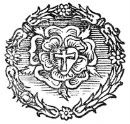
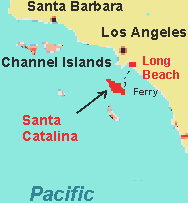 The second place I checked out during my recent time off from clerkship rotations was Santa Catalina Island. Catalina is one of the Channel Islands, about 22 miles long and about 20 miles off the coast of Los Angeles. As with the Salton Sea, the Channel Islands off of Southern California have intrigued me since grade school. I first heard of these islands in 3rd or 4th grade when I read the children's book
The second place I checked out during my recent time off from clerkship rotations was Santa Catalina Island. Catalina is one of the Channel Islands, about 22 miles long and about 20 miles off the coast of Los Angeles. As with the Salton Sea, the Channel Islands off of Southern California have intrigued me since grade school. I first heard of these islands in 3rd or 4th grade when I read the children's book 






